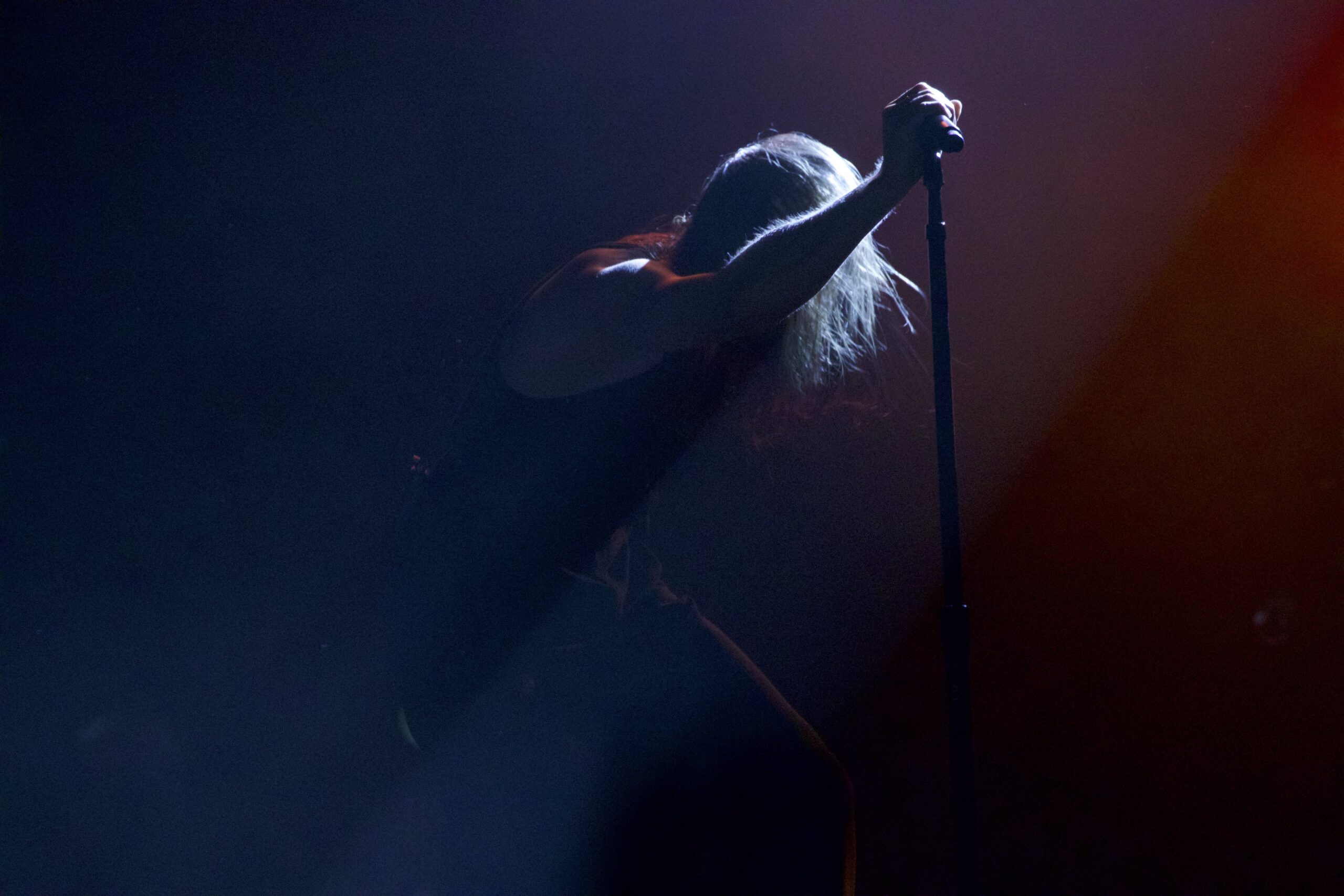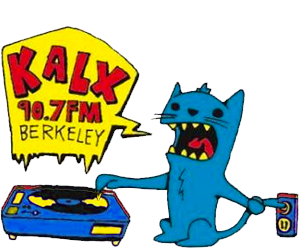By Chris LeBoa and Kate Rose
“In about 2008 I made a playlist of Russian darkwave — that’s how I became aware of molchat doma,” Alex tells me, half a bacon wrapped hot dog and at least a few drinks into the evening. We are two amongst a crowd of a few thousand at the Warfield Wednesday night to see Molchat Doma — arguably the best Belarusian post punk/new wave band. I may be the only person wearing something other than black in this sea of strangers brought together to hear the crooning voice of Egor Shkutko reaching out in Russian over an eerie mix of synths and washed out guitars. The sound both transports you directly to the 1980s and is incredibly fresh, new and different from anything I have ever heard.
Unlike Alex I can’t claim to have known the genre for the last decade. My love affair with the band has only spanned a few short weeks since my partner Kate showed me this Georgian dance called ghost floating on TikTok. (https://www.tiktok.com/@deceits_band/video/7203185431226207530).
From my perch at the edge of the Pacific the country, people and music of Belarus — the old soviet state to the north-west of Ukraine — only entered my consciousness last year when a rigged presidential election initiated waves of protests and a subsequent violent crackdown. I read updates on the situation in Belarus from the Russian artist Victoria Lomasko from the front lines of protest in Minsk. Victoria’s work has been an inspiration for a while in the way that the art* that she does tells stories of lives I will never live in ways I have not seen before. Specifically, in their book Other Russias, she sketches people during her interviews with them like the prostitutes in Moscow working to keep each other safe, truck drivers protesting unsafe conditions, or the criminal trial of Pussy Riot, the feminist punk band who dared to speak out against the Putin regime.**
As a reporter of different music and events that occur in my home, my responsibility to the reader is to try and convey by any means necessary the feel, vibe, lesson, learning from cool things, like Molchat Doma coming to town. Getting to see live music is a privilege — of my health, of living near a transit stop, of having money for tickets, and even if you read this article and check out Molchat Doma in some other time or space based on the record, you will never really understand the whole sensory experience — as music is best loud, and live.
Both Victoria Lomasko and Molchat Doma exist today as artistic refugees — compelled to act against the violence instigated by the Putin and Lukashenko regimes in Ukraine. Molchat Doma has actively spoken out against the war both in their work and through donating some proceeds from their concerts towards supporting the Red Cross in Ukraine (https://twitter.com/molchatdomaband/status/1498671381285851140?lang=en). Tonight, Kate and I will try to use some tools pioneered by Vioctoria Loshanko for this review. This means 1) We will draw by hand people, places and the scene generally as we see it 2) We will approach fans as journalists asking how they came into the music, how they relate to it, and what this music means to them 3) We hopefully will have the opportunity to ask the band some of these same questions.
In the merch line before the show I meet Clarissa who heard of the band Molchat Doma from their girlfriend about a year ago. “We expected more goths to be here,” they tell me from behind layers of black eye shadow. “Molchat Doma got us into Russian doomer music,” they tell me. “Their stuff is so chill and surprisingly soothing.”
I agree with her —the instrumental sections of their set give the feeling of being in a steampunk aquarium. The base plays a low line, causing the ground to vibrate while a strobe bathes everything in a blue light. Kate twirls next to me, arms outstretched while a group in matching T-Shirts kick their legs and laugh to one another. The vibe changes drastically as the guitarist Roman Komogortsev takes charge of a keyboard and leads on a grittier than polo y pan DJ set.
“I love the measured consistency of the synth. You can melt into it” Kate shouts to me over the thumping base. “It’s both dark and euphoric — my body can feel the beat and wants to move to it. I never want this show to end.” We meet an equally as enthralled Russian speaking fan named Lisa in a silver sequined top whose favorite song is Na Drue — she writes the name in Russian in my notebook to make sure you the reader get to experience it too.
The bse player, Pavel Kozlov was stoic throughout the set, dark eyebrows focused on a clean shaven head while the guitarist Roman, jumped in circles — his all white and sparkled guitar shining into the crowd. Egor, the vocalist, danced the whole show — his long black mane swaying to the beat. His voice was that of a one man Russian orthodox choir. The lyrics are almost holy sounding Gregorian chants. A poor English translation of their song Cryno reads something like this:
Эмалированное судно
Окошко, тумбочка, кровать
Жить тяжело и неуютно
Зато уютно умирать
Enamelled vessel
Little window, nightstand, bed
Life is rough and not so cozy
But dying is (cozy)
x2
И тихо капает из крана
И жизнь растрёпана, как блядь
Выходит как бы из тумана
И видит: тумбочка, кровать
Quiet dripping from sink
And life is messy like a slut
Appearing from the fog
And seeing: bed, a nightstand
И я пытаюсь приподняться
Хочу в глаза ей поглядеть
Взглянуть в глаза и разрыдаться
И никогда не умереть, никогда не умереть
And I’m trying to lift myself a little
And look her (assuming his life) in the eye
Look her in the eye and break down (cry very intensely)
And never die
My one wish was that they had a drummer instead of a drum machine to back them up. The lighting throughout the show changed with the vibe and temp of each song. I made my way to the balcony level when three spotlights shone down on each band member, embossing them in little white bubbles on the stage.
I don’t end up getting to ask the band more about their musical process but do meet one of their friends behind the merch table — who claims to not speak English well in a heavy Belarusian accent but speaks it perfectly.” It’s crazy to be here” he tells me. “We were all friends in college like 10 years ago and now we are here. In Belarus nothing changes — the President, the regime, the life stays the same. We can get visas to Europe but it’s impossible to get a job ‘cause everyone only speaks Russian.”
The band has been a path out — and have been on the road for years at this point — their tour is coming to a close though in late 2023 — with the last concert scheduled for Kyiv — a time at which they and the people of Ukraine can hopefully find rest and peace.
Note: If you want to read more on the band this interview in Creem magazine is good https://www.creem.com/fresh-creem/molchat-doma-interview
Footnotes:
* Art I feel is the use of different tools, or mediums to express one’s interpretation of the universe around them and understand how we each fit into that universe. Each of us, based on we are born, our gender, sexuality, etc influences the way we interpret the universe and the situations we find ourselves in. Music, art, poetry gives us ways of trying to express those situations to others in a way that they understand – not just with the analytical part of their brain, but with their whole human being. The feel of the last goodbye, the touch of a beloved, the smell of teargass hitting one’s eyes as they protest the unfair election of Lushanko the Belarusian leader who “won” a rigged election in 2022 and now helps Putin fire cross border rockets.
**You can see more of her process by getting the book other russia’s off the Nib or by checking out this documentary that features some of their work https://canneseries.com/en/series/draw-for-change-1/?fbclid=IwAR0ULCibqJ0c09DIvCgXO66Zsr54JQyokqjraooWEyiBizbcs2_LmfApFos


